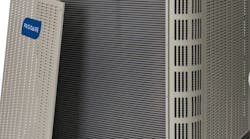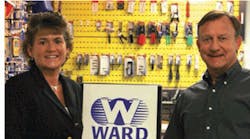Superlatives don't matter anymore in business. Being the biggest, the oldest or the best at whatever it is that you do is no guarantee of success. Today, a successful business is about your ability to interpret what's happening in your markets as well as the wider world and then adapt. Staying put is not an option.
For Ward Supply Co. Inc., a wholesale distributor based in Rochester, NY, the ability to evolve has been a hallmark of its success. Since its founding in the 1950s, the business has grown to include a distribution territory of 25 counties in upstate and northern New York and two branch offices in Canandaigua and Syracuse. From a business that Leon Ward started as a supplier of cast iron furnaces and boilers, it has become a full-service HVAC wholesaler that includes everything from sheet metal fittings and hydronic heating radiation and pumps to temperature controls and humidifiers.
It was in the 1990s when Ward Supply faced its greatest challenge and had to become especially open to change, says Terry Ward, president and CEO of Ward Supply. As manufacturers moved away from the region and the economy faltered, Ward had to look at his entire operation and make some tough decisions about the business so that it, too, would not have to nail a “going out of business” sign to its door.
What Ward did was lead an organizational transformation of the business in 1997 that focused on improving results and getting rid of bureaucracy. “I realized that we needed to shift away from a culture that utilized a management style of middle managers who were assigned the role of telling people what to do and when to do it,” he says. “This was an old-school method that created a layer of overhead that we could not support in a new era of lower gross profit margins.”
That meant cuts that ultimately reduced the Ward staff from 41 employees in 1996 to 25 in 1999. But this was not just about reducing payroll, it involved remaking the culture of Ward Supply. As Ward put it, he did not want to have a line of employees outside his door asking him what to do next. Instead, employees became empowered to make decisions that they believed were in the best interest of the customer without having to worry about managers second-guessing them. They also became cross-trained in different functions so that a Ward Supply customer would never have to hear an employee say, “Sorry, that's not my job.”
Page 2 of 5
For Terry Ward, the son of Leon Ward, who learned the business in high school and later joined full-time after he graduated from St. John Fisher College with a degree in Business Management, remaking the culture of the business took a lot of hard work. After all, many of the employees had been a part of the business for a long time, and they were accustomed to doing their jobs a certain way. To help them through this transformation, Ward formed a leadership team of four veteran, well-respected employees who held key operational roles in the company. “We designated this team as the go-to people with whom the employees were already comfortable,” Ward says. “These leaders were trained to coach and lead by example so we could empower the workforce.”
Many made mistakes along the way, Ward acknowledges, but the experience was an education for everyone and allowed them to learn. Employees who were not the right fit for this new culture left the company. “We had to make the adjustments as we went forward,” he says. A key component over the years has been the constant presence of the leadership team and its ongoing support of the employees. Nearly 15 years later, this transformation is the norm, although Ward says maintaining this culture still requires coaching.
The results were evident early into the transformation process. Even as the employee base had shrunk by 40 percent in just four years, Ward Supply's revenues in 2000 had surpassed its 1996 revenues, reversing the downturn. “We are much quicker to respond to our customer requests and we are leaner with less headcount overhead,” Ward says. “Our employees feel they have more involvement in the sales and service process. They are more satisfied with their day's work. They feel they are more directly responsible for the success — and the shortfalls — of the corporation.” Ward can measure this transformational success in another way as well: employee longevity. The average employee has been with Ward Supply for more than 15 years.
Ward says the leadership role is the most fulfilling part of his job — and he's done every job in the company. High school was his opportunity to learn the basics, and, after graduating from college, he started in inside sales and purchasing and later took on the responsibility of purchasing several lines of controls. When his father retired in 1981, he sold the company to Ward and Angelo Campisi, a vice president. Campisi retired in 1996 and sold his stock to Ward.
Page 3 of 5
Like other businesses, the recent economic recession has hurt Ward Supply. Ward says business is down about 15 percent in gross revenues since 2007. While this is not bad when you compare it with others in the industry, it has hurt Ward Supply's ability to grow and preserve working capital. Still, the culture of Ward Supply that created a lean and nimble organization has helped it through these difficult times. “It has taught us how to retract and exist within the business volume. We have maintained our profitability throughout the recession with no loss years,” Ward says. And Ward Supply maintained its corporate contributions to the profit-sharing plan each year, he says.
While Ward says the tax credit incentives on HVAC systems did bring in significant business, he and others in the industry are paying for it now. “We shipped many more furnaces and boilers than we would have realized without the incentives,” Ward says. “They did what they were supposed to do — stimulate the economy.” But he says the focus on the money savings of the systems destroyed the value proposition of comfort, efficiency, reliability and accessories. Sales professionals had honed the sales process over many years, but the incentives deflated their value story. It's now about what consumers can get at the cheapest cost, he adds. He'd like to see a new round of tax incentives that focus on energy savings and extend to the issues around indoor air quality and comfort.
Selling so many new systems in such a short period of time also stunted future sales of HVAC systems. During the two-year period in which the tax incentives were in place, Ward Supply's market share and unit volume grew disproportionately to its historical pace. “Now we are paying the price with fewer units shipped and market share eroding to the low-cost commodity brands,” Ward says. In the consumer's mind, according to Ward, brand names often mean higher prices. “Today's price-conscious and tight-walleted consumers are buying cheap. ‘Just put in what I need to get by’ is what our dealers keep hearing,” he says. “There is very little confidence in today's economy, and our industry is struggling because of it.”
Page 4 of 5
Having a strong mix of accounts and customers has helped Ward Supply weather the economic storms over the years. Ward Supply sells to HVAC contractors/dealers, mechanical contractors, industrials, self-servicing property managers/owners, school districts, campuses and municipalities. About 65 percent of the company's sales are to residential accounts, with the balance to commercial industrial accounts. Trane products account for about 74 percent of Ward Supply sales. Ward Supply is a Trane Independent Wholesale Distributor for residential and light commercial equipment and Service First Parts.
Ward Supply has developed a niche in commercial controls, and Ward says having this expertise as part of its product offering helps to support its parts business in those applications. “We're not afraid to reach out to an industrial prospect or campus and make them an offer,” he says. Being aggressive and open to new opportunities is essential for continued growth at all times but particularly important during flat economic cycles.
With a distribution territory in New York, Ward Supply supplies daily transfer/stock replenishment to its branches in Syracuse and Canandaigua and four 18-foot delivery vans for delivery service to its customers. Keeping an open line of communications with customers has been a hallmark of Ward Supply's customer service. “Our employees know not to promise something we can't deliver,” Ward says. At the same time, territory managers and branch managers have pickups and SUVs to assist with order service and will bring parts or emergency items when they go on customer calls. “We spoil our customers with our service level,” Ward says.
Very often, customer service can be the differentiator. Ward Supply is among several full-line, value-added HVAC suppliers in the region. “They are good competitors who can't afford to make price the differentiator,” Ward says. He knows that multifocus suppliers who sell HVAC as a commodity and use low price as their sales strategy will eventually fall short. That leaves Ward Supply as the consistent, reliable choice.
As the leader of the business, Ward also stays on top of economic, technology and industry trends. Ward says he understands the power of technology to make his staff more effective for customers. “Probably 90 percent of our people have a smartphone, and our sales team is equipped with laptops, iPads and smartphones,” he says. The company allows its employees to access the Internet at work (although they restrict certain sites that are not productive for work, like Facebook). “We use electronic technology wisely.”
Page 5 of 5
This extends to how Ward Supply trains its employees and customers. Training was once “baptism by fire” that amounted to one half-day of computer orientation, and then you were put on the counter or in the field. This was not a good scenario for either the customer or the employees. Having a tech rep assigned to several layers of customer and product technical support, which includes training, has alleviated this issue and creates a greater comfort level for everyone. The tech rep is also responsible for employee development, training and technical assistance to the staff. Ward Supply also utilizes self-study programs through HARDI, Blue Hawk, Trane and others.
Leading change is never easy, and sustaining it is even more difficult. “It is a skill that requires constant attention and education,” Ward says. He's been able to keep Ward Supply in front of the change curve by staying attuned to the issues and then making sure that his employees understand and recognize the challenges ahead. He then gives them the tools to make great things happen. “You can measure the success of leadership by longevity,” Ward says. “We have long-term employees, customers, service providers and suppliers.”
Michael Maynard is a contributing editor based in Providence, RI. He writes frequently on HVACR, construction and architecture issues. Contact him at [email protected].
Best Practice
Strong Human Resources ProgramDefinition and Example: The company has always maintained a well-designed HR and benefits program that defines policies; benefits; labor law rights and requirements; communicates updates to employees regularly. HR training extends to branch managers to maintain continuity across all employees. Leadership's attention to the detail in the employment program has helped to establish a culture of Ward Supply being a great place to work.
Significance: Many smaller employers overlook the importance of a comprehensive HR program. It is important for employees to know their rights and understand their benefits value when measuring their opportunity at Ward Supply. World-class employers like Kodak and Xerox and top-rated health care providers have influenced the Upstate New York market. HR policy and benefits standards are higher due to the competitive employment environment.
Benefits: This practice promotes employee longevity, which now stands at more than 15 years on average. Employees always know where they stand with respect to HR issues. A well-designed HR program running in the background allows the company to focus more on customer-centric activities and maintain their reputation for customer service excellence.
Procedure: We review and update periodically all HR training, policy and other documentation. Terry and Lisa Ward communicate updates and status reports via email as soon as changes occur to provide accuracy and continuity throughout the organization.
People involved: Leadership team; office staff; branch managers; safety coordinator; out-sourced HR service providers.
Timing: Employment codes and laws change frequently. Benefits programs are less time-sensitive but require monthly monitoring as part of an interim financial review. We complete a comprehensive annual review before the new calendar year to include necessary updates. We can edit employee handbooks in-house when required.
Cost: Every five years, the company contracts a third-party HR consultant to review and update policies and procedures. HR consulting fees may average $3,500 over a 12-week period, which includes training, updates and HR operations manuals retained for ongoing reference. The fee pays for itself several times over when compared to employee turnover and labor law infractions. Leadership and administrative staff perform HR tasks as part of their job description.
Contact: Leadership Team HR Coordinator Lisa Ward: [email protected]










